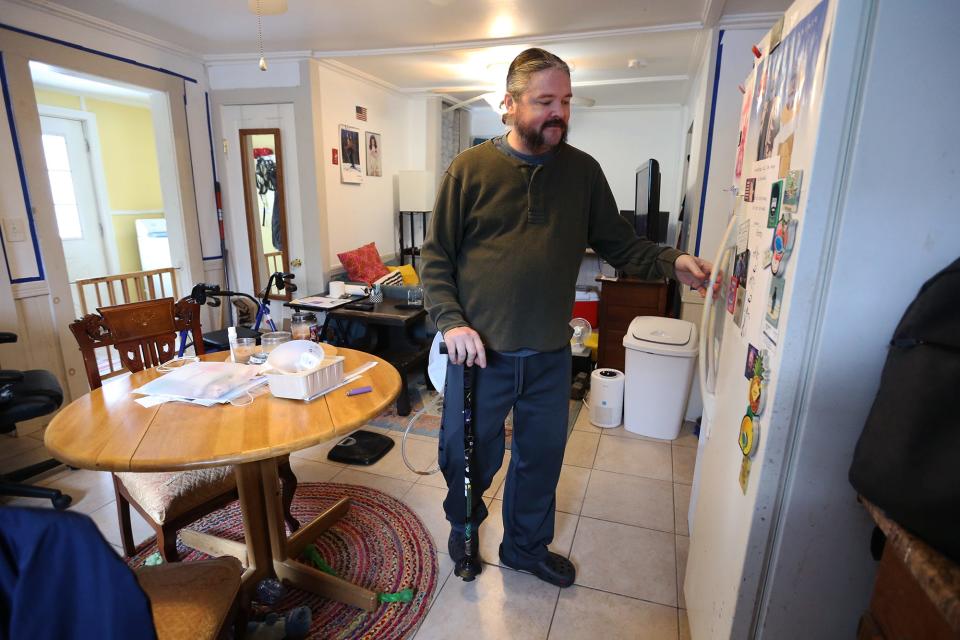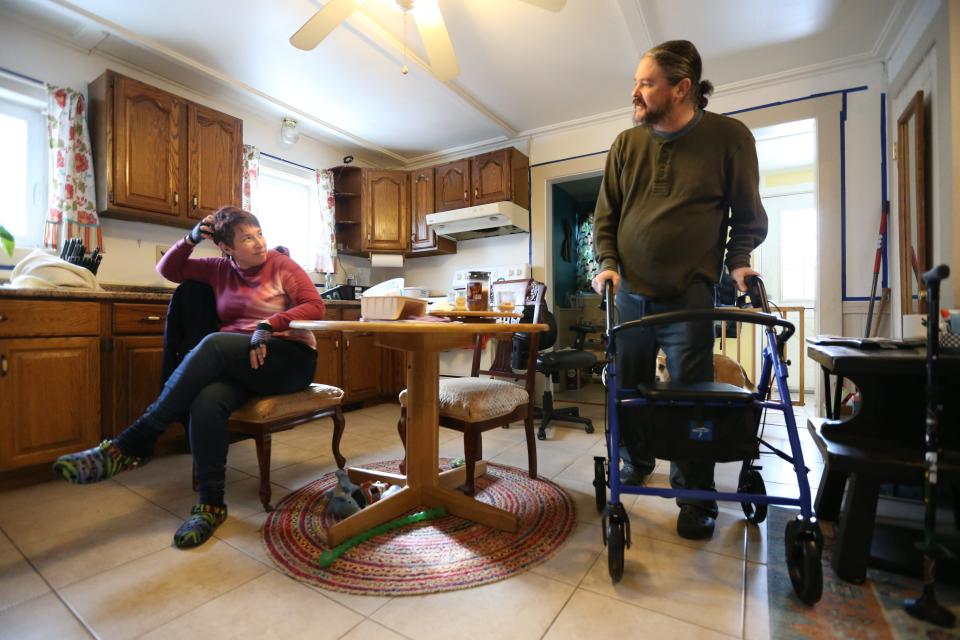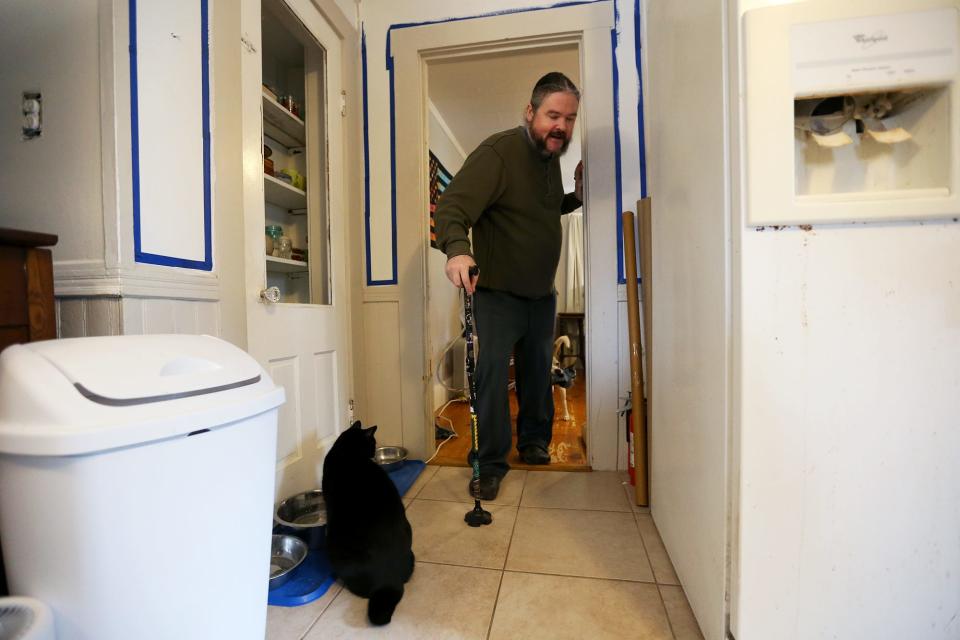Seacoast man struggles after bout with transverse myelitis, extremely rare spinal disorder
SOMERSWORTH — A 42-year-old Seacoast man is home recovering from a rare spinal disorder that temporarily left him unable to walk and could keep him out of work for months if not longer.
Benjamin Brighton, a graduate of Portsmouth High School and the University of New Hampshire, said he still struggles to walk without the use of a cane or a walker, and is dealing with “a combination of intense pain and numbness at the same time.”
“To be blunt, when I get up to walk I look like a baby giraffe,” Brighton said during an interview last week. “It’s fair to say that I’m not going to be running any marathons anytime soon, and walking up a flight of stairs is like climbing Mount Everest.”
Doctors at Portsmouth Regional Hospital, where he was admitted and treated for three weeks, diagnosed Brighton with transverse myelitis, a rare swelling of the spinal cord.

In addition to struggling to walk because he is still working to gain control of his leg muscles, Brighton is unable to urinate on his own because of the swelling of the spinal cord.
Medical staff had to insert a urinary catheter.
“The urologist also made it clear my ability (to urinate) on my own may come in a couple of weeks, may come back in a couple of years or it may never come back,” he said. “There may never be a full normal.”
Brighton’s ex-wife, Kate Brighton, started an online fundraising page to help him raise money to pay for his living expenses, health care costs and adjustments to his Somersworth home needed due to his limited mobility, she said.

Although the two are no longer married, they remain close friends and she has helped care for him since his release from the hospital about two weeks ago.
“Some of the work will be easy, like rearranging the house into a one-floor layout. The house will need a small ramp from the driveway to the deck and handrails in the bathroom. And, of course, unexpected things will arise,” she said. “Some of the work is major, for example repairs to or replacement of the heating system, roof repairs and plumbing repairs.”
Possible link to vaccine questioned, but no answers
Brighton, who is a real estate appraiser, said the symptoms began on Dec. 28, about five days after he received the Johnson & Johnson COVID-19 vaccine.
Asked if he believes the vaccine caused the disorder, Brighton said, “Who knows? It could have been. Certainly the timing is really suspect. I had the shot just days before I started coming down with the symptoms.”
Brighton stressed none of his doctors told him the vaccine led to the disorder and there’s nothing in his medical records making that connection.
Public health officials highly recommend everyone 5 and older get vaccinated against COVID-19, citing highly effective protection against the spread of the coronavirus and, even in breakthrough cases, against deaths and hospitalizations.
But some COVID vaccines may be better than others. Because of a rare blood-clotting disorder potentially associated with the J&J vaccine, the U.S. Centers for Disease Control and Prevention in December recommended that people receive either the Pfizer-BioNTech or Moderna COVID-19 vaccines instead of the J&J vaccine.
Brighton said his doctors did not offer any opinions about what led to him suffering from transverse myelitis.
What is transverse myelitis?
Johns Hopkins Medicine states transverse myelitis is a disorder caused by spinal cord inflammation.
"It is characterized by symptoms and signs of neurologic dysfunction in motor and sensory tracts on both sides of the spinal cord. The involvement of motor and sensory control pathways frequently produce altered sensation, weakness and sometimes urinary or bowel dysfunction.”

The cause of 60% of cases “may remain unknown” while “40% is associated with autoimmune disorders such as multiple sclerosis,” according to John Hopkins.
Laura Montenegro, a public information officer for the New Hampshire Department of Health and Human Services, acknowledged the European Medicines Agency listed transverse myelitis as a possible safety concern with the Johnson & Johnson vaccine.
“This was based on 11 possible/probable global cases out of an estimated 33 million Janssen (Johnson & Johnson) vaccine doses administered,” she said recently in response to questions.
Regional Development: Portsmouth is emerging as a global supply chain hub. What we know about future plans
Based on U.S. reporting, the Food and Drug Administration and CDC have not identified transverse myelitis as a potential side effect of the vaccine, "but safety data continues to be reported and reviewed," Montenegro said.
She pointed to the CDC's “preferential recommendation” calling “for the Pfizer-BioNTech or Moderna COVID-19 vaccines to be administered over the Janssen vaccine because of associations identified between the Janssen vaccine and the rare occurrence of Thrombosis with Thrombocytopenia Syndrome, and Guillain-Barre Syndrome.”
The European Medicines Agency in October recommended transverse myelitis be added to the label as a side effect to the J&J vaccine.
That led the company at the time to put out a statement acknowledging that "Rare cases of transverse myelitis have been reported following vaccination with the Johnson & Johnson COVID-19 vaccine."
The company added that “while the chances of experiencing these conditions are very low, the product information of COVID-19 vaccine … will be updated to include important information about the signs and symptoms of transverse myelitis.”

Portsmouth doctors explain disorder
Doctors from Portsmouth Regional Hospital, who stressed they were speaking about transverse myelitis generally and not about Brighton’s case, said the neurological disorder is rare.
Typically there’s only three cases for every 100,000 people in the general population, according to Dr. Matthew Robertson, a neurologist at the hospital, and the severity of the cases can cover “a wide spectrum.”
“It can range from some temporary tingles and weakness to kind of a full-blown paralysis,” Robertson said, including “paralysis of arms and legs and significant blood pressure issues.”
Rising tides: Chucky Rosa worried about future of Seabrook Beach. Experts weigh in.
Doctors have seen an increase in transverse myelitis cases during the pandemic from people who have been diagnosed with COVID-19, Robertson said.
Asked if he thinks transverse myelitis could be caused by taking the Johnson & Johnson vaccine, he said, “I think it’s very unlikely, but I don’t think you can speak in absolutes, there’s a chance.”
But the rates for people diagnosed with transverse myelitis are “significantly higher” in people who have had COVID, rather than people who have COVID vaccines, he said.
“I would still take the vaccine over rolling the dice with COVID,” he added.
Brighton said he has not been diagnosed with COVID-19.
Dr. Thomas Wold, chief medical officer for Portsmouth Regional Hospital, stressed that because transverse myelitis has been classified as a potential adverse reaction to the vaccine, it puts doctors on alert.
That way, he said, if someone develops symptoms, providers “should quickly identify and treat the disorder.”
Wold noted that there have been millions of Johnson & Johnson doses administered without issues and added, “I still think it’s safe.”

A scar on your spine
Robertson said the long-term prognosis for people diagnosed with transverse myelitis “really depends” on the severity of the case.
“The deeper you dive in terms of severity (with) weakness or associated symptoms, the harder it is to come back up to the surface or get back to normal,” he said.
Some people totally recover from their symptoms, he said. “There are also people who end up with a certain amount of weakness,” he added.
He described it as “kind of like a scar on their spine.”
He stressed, however, the disorder is rare.
Brighton had initially thought the disorder could have been caused by head injuries he suffered during a March 2021 incident, but doctors ruled that out, he said.
Johnson & Johnson issued a statement in response to questions from Seacoast Media Group.
In it, the company said “there is no greater priority than the safety and well-being of the people we serve, and we carefully review reports of adverse events in individuals receiving our medicines or vaccines.”
'Breathing new life into me'
Brighton said he remains upbeat, even though he does not yet know his long-term prognosis.
Despite going through terrible pain because of the spinal swelling, Brighton said, “I literally only went through the physical ordeal, I’ve never been scared, I’ve never been terrified, I just landed on acceptance.”
Brighton described himself as a “normal 42-year-old, overweight and out of shape but normal,” before the symptoms began.
Five days later, he couldn’t walk, he was in intense pain, he couldn’t urinate and he endured “full body spasms,” before he was taken to Portsmouth Regional Hospital, where he remained for three weeks.
But he is still optimistic.
“The whole thing is breathing new life into me,” he said.
Brighton just recently began working from home, but because he still struggles to control his legs, he can walk only short distances and he can’t drive.
Rachel Forrest: I’m ready to talk about my teeth — I have none. And I shouldn’t feel ashamed
Oral Health: Expensive dental care leads to bad teeth, poor health and pain for many in New Hampshire
He recently had a friend drive him to two property appraisals.
“I just get really tired, really fast if I do anything,” he said.
Brighton appreciates those in the community who have donated to his fundraiser or will donate in the future.
But for those who can’t, he is hopeful friends will drop by or send him a text when they have a few free minutes.
“Just come by and knock on the back door, I’m not going anywhere,” he said with a laugh. “It would be nice to have company every once in a while.”
Kate Brighton said she’s “super happy and super proud” of the way her ex-husband has responded physically and emotionally to the ordeal.
“This is the kind of situation that could have knocked anybody down. I would have a hard time staying upbeat after what’s he’s been through,” she said. “He’s like a totally different person now. He’s taken this near-death experience and used it as a second chance at life.”
Fundraiser: gofundme.com/f/lets-help-ben-get-his-legs-back
This article originally appeared on Portsmouth Herald: Benjamin Brighton struggles to recover from rare transverse myelitis
